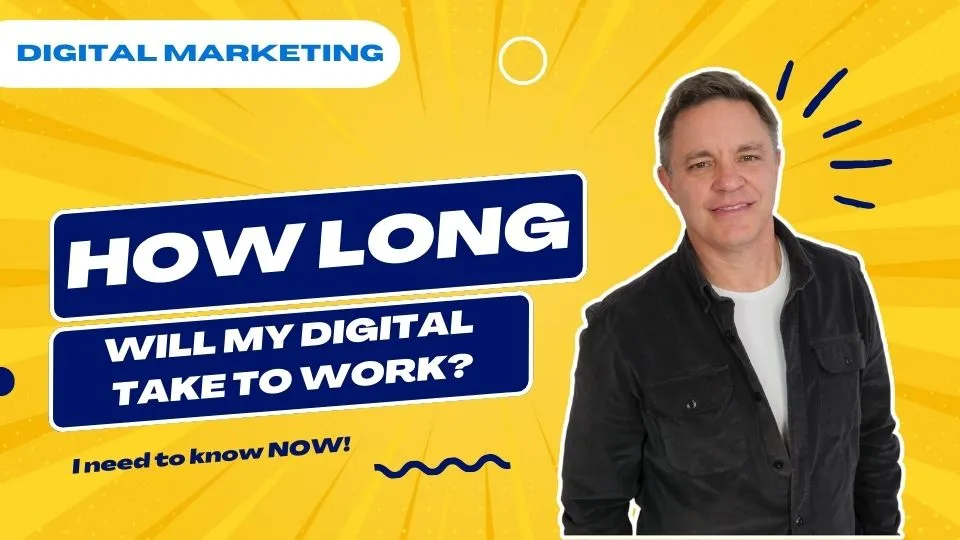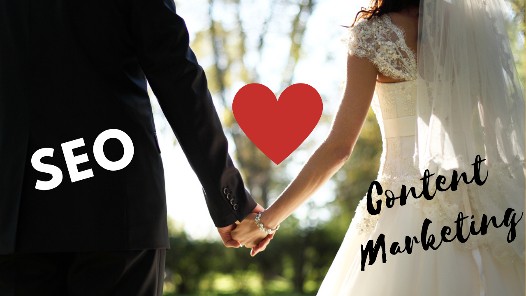
Yikes. You’ve asked the right question.
But a tough one.
There’s so much going on. We’ve got AI (generative search) entering the battle and Google updating every 20 minutes.
I’m exaggerating, but it’s a LOT.
How long will digital marketing take to deliver a return on your investment? It is a vital question for any business in any sector. You can usually expect to see some growth from 3 months and greater results from 6-12 months, but there are several influencing factors to consider, including your starting point, how much you have to spend and your knowledge and resources.
Contents
- When will I start seeing results from my digital marketing?
- Factors influencing the speed of your digital marketing results
- How you can maximise your speed to success
- Ready for success?
When will I start seeing results from my digital marketing?
People often think that digital marketing will bring almost instant results, but this is not the case. It takes time and effort to establish an effective digital presence.
Paid Search and PPC can provide an early boost
Using paid advertising such as PPC with Google or another platform can provide a quick boost to start off an online campaign but without all the basic good practice SEO in place, this will be much more expensive than it should be – you will be surcharged by Google although they will not tell you this !
Nothing good happens until your digital footprint is complete and verified
For sustainable long-term growth, there is no substitute for doing all the other work involved in setting up and then running a complete digital footprint for your business.
Investing properly in your digital marketing is essential, as it directly impacts your customer engagement, sales and profits.
Realising the true value of digital is an important step in your path to success. Investing the necessary time, effort and money now into creating a brilliant digital strategy will reward you many times over in the future.
Remember, great digital marketing campaigns keep working 24/7, across multiple platforms to a vast audience. This has the power to transform your business!
Outline Timeline:
0-4 months
Following an initial planning process, you can expect to be in the building phase for a fair few months before even reaching a break-even point every month. You’ll see some exciting metrics looking healthier each month but the bottom line is that you’re spending money without it returning in the form of profit.
4-9 months
Breakeven…HURRAH!
You will see that your monthly costs are now equalled by a corresponding increase in profits. You’ve still got all those early months to cover the cost of yet but at least things are now looking hopeful and each month the investment has stopped.
12 months onwards – The magic happens!
Now you should really start to see your profits soar.
From 12 months onwards it will be possible to analyse data for a whole year of business operation. This allows you to better understand the effects of certain influences, such as seasonal trends, and to optimise your digital assets most effectively.
Factors influencing the speed of your digital marketing results
- Your starting point
- How much you have to spend
- Your knowledge and resources
- Technical ranking factors
Your starting point: In this context, your starting point is where you’re currently at in terms of digital marketing. You may be right at the beginning of your digital journey, fully integrated, or somewhere in between.
More Data = Faster Results!
The more data you have the quicker the process is and the faster you’ll see results. A really fast campaign starts when there are several months or years of the following data:
- traffic, conversions and revenue
- number of visitors to your site
- where do visitors come from e.g. direct or organic search, social media, referral
- how many people are new and how many are returning visitors
- how many pages do visitors read, do they enjoy reading them, how long they stay on each page and what actions do they take
- how many people arrive only to leave immediately
- which pages are popular, which cause people to leave
- what percentage of internet use is carried out on mobile
- how much it costs for each visitor to your site ( if you are already doing some digital marketing)
- number of conversions, i.e. a visitor actually taking action or buying something
- conversion sales funnel – do people take action by clicking on a free download but do not go on to buy a product – consider whether it might be time to pick up the phone.
Data Analysis Informs Future Optimisation
How much you have to spend: Your budget will determine how quickly you can progress. As a general rule, the bigger the company and area you wish to target, the bigger the budget you’ll need.
There are two main costs:
- Specialist advice
- Ad spend budget
The more you can spend the greater the resources can be applied to your project. This directly affects the speed at which your digital marketing can be up and running and getting you results.
You have the option of:
- Monthly installment – whereby you pay a fixed amount each month in exchange for an agreed number of hours.
- Paying a larger amount upfront for a heavier input of tech resources, to speed up the process and get faster results.
Ad spend budget
Paying Google a ton of money is a good way to shortcut the hard work of building a natural reputation, but be aware, you’ll be charged many times more than your competitors – if they have a better foundation and more complete digital footprint.
This can be a very expensive and short-sighted plan and the slow and steady tortoise will ALWAYS win this one.
Your knowledge and resources: This includes the amount of data history you have, how developed your website is, your own level of understanding about your digital marketing and what value you place on learning within your organisation, how aware people are of your brand, and how established your competitors are. You’ll have to work harder to compete if your competitors have been established a long time, with a strong online presence and internet rankings.
A Great Website Will Drive Growth Sooner
Technical ranking factors: Your website is effectively graded for its overall performance. Search engines send bots to crawl websites to find information. If pages take too long to load or information is difficult to retrieve then this will have a negative impact on your rankings.
Google’s Core Web Vitals is a test that the search engine applies to all sites because it concerns the speed of your site and Google is obsessed with site speed because… people are obsessed with site speed.
You can check your site speed here:
https://developers.google.com/speed/pagespeed/insights
The purpose of this is to assess how your pages perform, to improve user experience. If you don’t do this Google will penalise your poor performance, pushing you down in priority and not showing you to web users (i.e. you’ll find your site on page 3 and beyond) while charging you more for it.
Wordstream summarises the 7 signals which form Google’s page experience assessment.
Off-page ranking factors: These are being measured by Google elsewhere from your site, and primarily involve backlinks.
On-page ranking factors: These are mainly related to the keywords and informational quality of your pages.
Get started today with a website audit & FREE 30 minute consultation.
Get in touch with us today and we’ll be able to provide a fascinating insight into your current digital position within a free 30 minute consultation.





I’ve been exploring terpene-based products live terpenes recently, and I’m really enjoying the experience. The scents are in the chips, typical, and pleasant. They tot up a gracious touch to my daily routine, helping congeal the atmosphere and atmosphere. A large hit upon after anyone who appreciates perfumed wellness tools.
http://primalex.com.ua/przewodnik-po-slotach-online-wszystko-co-musisz/